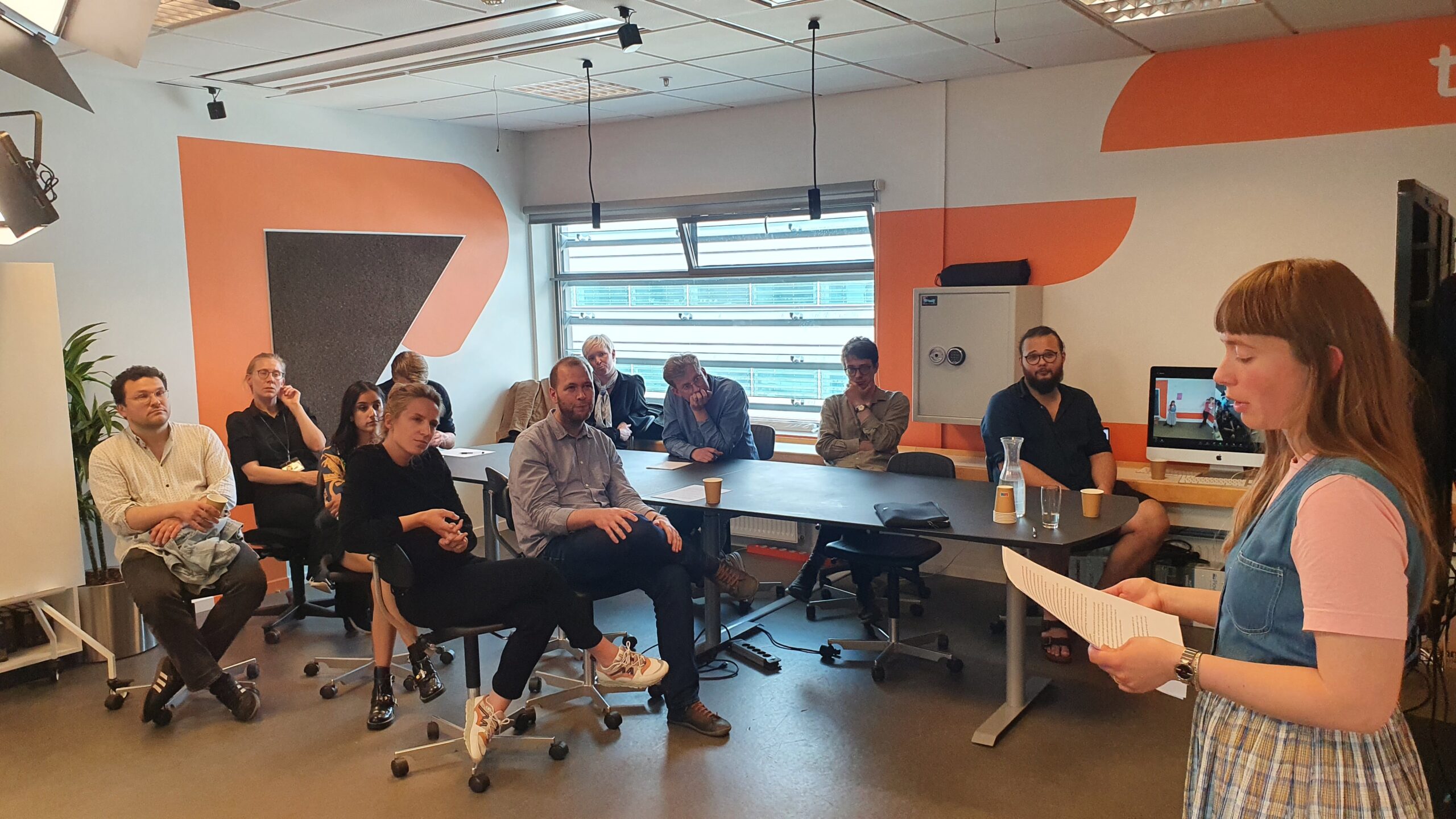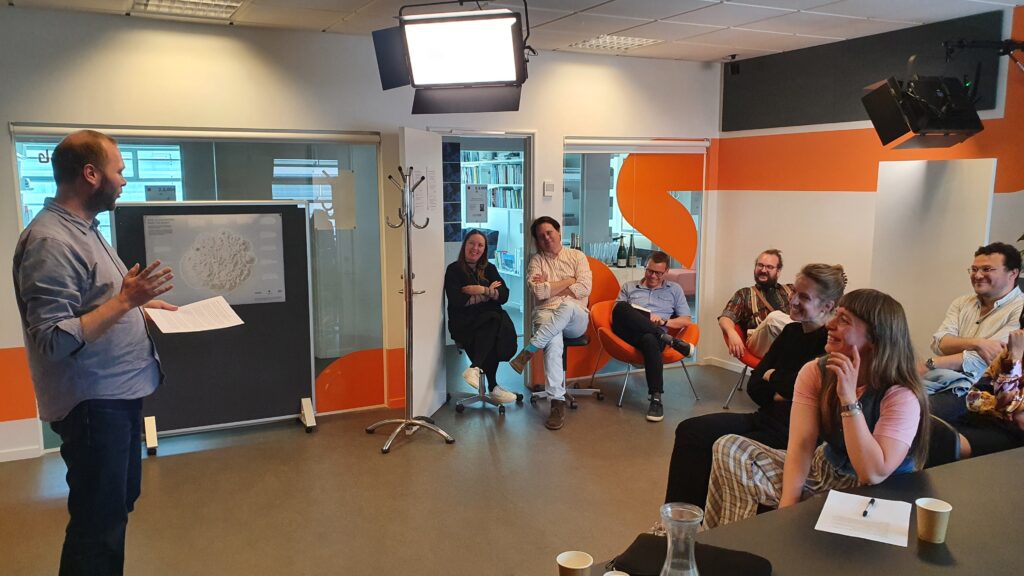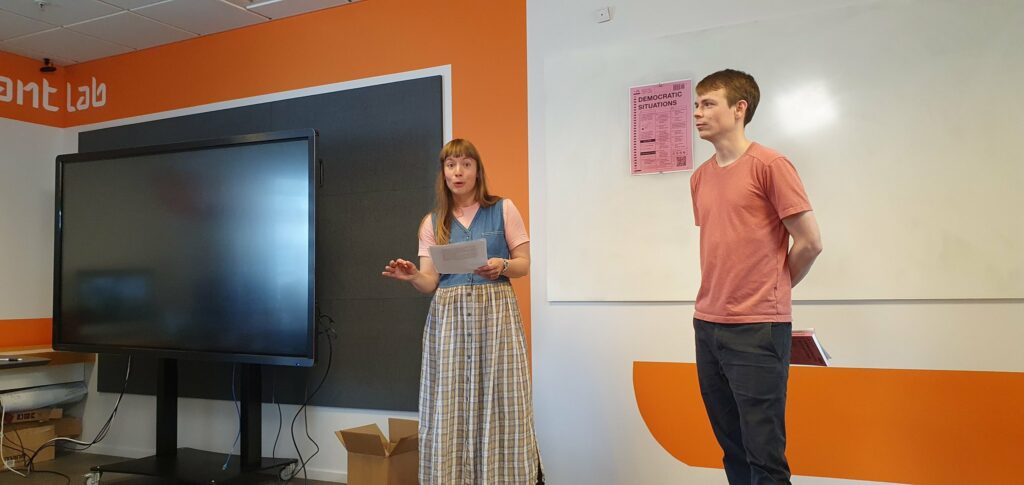Democratic Situations is the name of an edited volume published by Mattering Press in May 2022. As the editors of the book, we (Irina and Andreas) would like to take this opportunity to report on two events associated with its publication: An open panel at EASST 2022 in Madrid in July and a book launch event at the TANTLab in Copenhagen in June.
The panel at EASST was entitled “Situating Democratic Futures”. The organization of the panel and the formulation of the call for papers was a collective endeavor that we shared with David Moats (Helsinki) and Laurie Waller (Manchester), both contributors to the book. Organizing such a panel in Madrid was a good opportunity to build on and extend existing conversations, given that the 2017 workshop from which the book project arose was co-sponsored by EASST.
The EASST 2022 panel served to open new conversations with the recent book in mind. We received 15 abstracts, out of which 10 papers were presented at the conference. All abstracts were from researchers who had not been involved in the original book project – or rather all but one, since Endre Dányi, our Mattering Press editor, participated with a paper in collaboration with Amade M’charek. Some presentations tackled themes at the heart of the study of democracy, such as ‘innovation parliaments’ (Stefan Böschen) and EU politics (Tessa Dunlop), while others examined space technologies (Zinaida Vasilyeva), big tech (Ivan Veul), and technodemocratic imaginaries of solar power (Monamie Haines). We take this as a welcome indication of how the book may help carve out a research agenda for researchers interested in pushing STS’ democratic imagination further and critically examining the big societal questions of our time.
Another recent event marking the publication of Democratic Situations was a book launch at the TANTLab in Copenhagen. Aside from toasting and celebrating with local colleagues, we were also fortunate that Anders Blok (Uni. of Copenhagen) agreed to make an intervention based on his reading of the freshly published book. Several people joined us online for this part, including a handful of chapter authors. With Anders’ permission we would like to share a lightly edited version of his comments here, since we believe they deserve a broad STS audience, and since they serve as a fantastic introduction to – and celebration of – the new book.
What follows from here on are Anders Blok’s words, originally spoken in front of a live audience in the TANTLab on the afternoon of 8th June 2022.
“What I would like to do is to give you three reasons for why you ought to read this book, and why you ought to read it in full. And one reason why I think the book calls out for a follow-up volume, casting the net even more widely.”
The first reason you should read this book is the core argument clearly spelled out by the editors in their introduction, and then echoed as a refrain throughout – showing, by the way, the value, I think, of having actually had shared conversations among contributors. The argument, in brief, that STS is not only important for elucidating the politics of techno-science but also, more generally, has the conceptual tools and methodological sensibilities to contribute valuably to the wider, if also more mundane, study of democracy in practice. That is to say, what the editors nicely and innovatively dub ‘democratic situations’.
It is important here, I think, that this argument cuts both ways, so to speak. On the one hand, it implies an expansionary move on the part of STS. No longer content to hang around laboratories, innovation labs and offices of regulatory science, STS scholars now seek out new fertile empirical grounds in newspaper debating rooms, in the corridors of EU bureaucracy, and in the halls of municipal administrations.
Conversely, however, this move also implies, as Helen Pallett and Jason Chilvers (2022: 119) write in their contribution: “humility and reflexivity on the part of STS scholars.” This is so, they continue, because we are forced “to acknowledge both the deep influence of democratic practices and systems on our knowledge-making, but also to recognize the role played by STS theories and knowledges in the empirical sites and contexts we study” (ibid.). As shown and discussed in several chapters in the book, this is true not least for participatory and deliberative models of democracy – models that, in practice, turn out to have quite divergent effects.
In short, by displaying this particular combination of expansionism and humility, this book successfully opens up new and important conversations in STS – conversations about how to study, compare, and intervene in democratic situations, and conversations on how the field as a whole has tended to think about its own commitments to democracy and democratization in some rather than other ways.
The second and related reason you should read this book, and read it in its entirety, is for the somewhat disjunctive but in the end productive sense this provides of being led across sites and settings that all have some recognizable relation to what we call ‘democracy’, but which are otherwise far apart. This is true geographically – although we tend to stay in the Euro-American realm at large – and it is true for the kinds of ‘zones of democratic tension’ to which the chapters attune.
I think there is the inkling here of an interesting proto-comparative imagination that the volume invites its reader to engage with – even as only one chapter, the one by Soneryd and Sundqvist, might be called comparative in the standard sense. So, for instance, whereas some chapters take us to the heartland of age-old democratic institutions – partly to show us their incremental forms of change – other chapters chart much more recent and still somewhat unsettled institutional terrains, from stem cell research oversight committees to participation in digital diplomacy.
Similarly, while some chapters attend to fast-paced dynamics tied to specific events – such as how campaigning technology was used and justified in the UK’s EU referendum leading to Brexit – other chapters document the slow-paced institutional accretions happening over decades whereby things like a European carbon trading market, in Véra Ehrenstein’s case, is build, upheld, and cautiously critiqued by technocratic activists. Activists who, on their part, are constantly on the brink of giving in.
Fittingly for such diversity, one finds across the chapters of this book a quite varied cast of intellectual interlocutors, whose proclamations and theorizations of politics and democracy are brought to bear on the situations at hand. Making no claim to exhaustiveness, and beyond the most canonical STS ensemble, I counted close-at-hand figures and concepts such as Isabelle Stengers on ‘hesitation’ and Maria Puig de la Bellacasa on ‘care’, but also farther-flung connections to Chantal Mouffe on ‘radical democracy’ and Hal Koch on ‘deliberation’ the Danish way.
In short, when taken and read together, this volume quite helpfully expands the frame on our established STS imaginations of politics and democracy, inviting in the process, I think, more comparative work on democratic situations.
The third reason you should read this book is a more idiosyncratic one, perhaps. But it ties into what the editors note astutely in their introduction, when they reference Latour to the effect that ‘ecological mutation’ is deeply entangled with current-day changes to democracy. Given my own interest in what I have acquired the habit of calling ‘the sustainable state’ – a speculative notion meant to signal the work ahead of re-aligning democracy to planetary ecological boundaries – I could not help but pay particular attention to the three chapters specifically on this task.
At the risk of extrapolating a bit too much, it is fair to say, I think, that the cross-cutting picture looks rather bleak. For sure, one cannot but admire the tenacity and skills of the technocratic activists in Brussels trying hard amidst persistent failures to ‘civilize markets’, as Callon would have it. And one may almost come to care for the farmer who courageously shouldered techno-financial risks during Samsoe’s renewable energy transition, only to be written out of the story. Yet, I find it hard not to take the story of Swedish water management as emblematic: here, the authors show, “local actors get engaged and try to do most of the work themselves in the absence of governing bodies handling the overflows.” (Soneryd and Sundqvist 2022: 115). Is this not the experience we all share these days in the face of climate change and biodiversity crises?
And so, it is tempting for me, of course, to point out that, while the present volume takes important first steps, more steps lie ahead if we want to re-deploy STS in the service not only of diagnosing, but of attempting to bring about something like a sustainable state, capable of integrating ecology and democracy. And thus also tempting to conclude that this is where a follow-up volume is called for. However, to do so would perhaps be to confuse my own preoccupations a bit too much with the collective project of this volume – or, put differently, I can in fact promise that more work will happen along these lines, but such a proposition is so far mostly of my own making, the specificities of which I invite others to help me negotiate.
Where I would claim the book already calls out for a follow-up volume, in the sense of an immanent overflow collectively registered but not fully attended to so far, is rather when it comes to the project of putting STS’ democratic imagination more firmly into dialogue with that of other fields and (inter-) disciplines. Rachel Douglas-Jones (2022: 178) puts it well, I think, when writing in her conclusion that “turning the analytic eye of STS towards democracy as practice […] means meeting the gaze of researchers in other disciplines”. She enlists empirical political scientists, ethnographers of democracy, bioethicists, and historians; to which I might want to add in the political theorists, including those attuned to democratic situations beyond Euro-America.
As someone who has long taken an interest in how Bruno Latour, in particular, has long since enlisted a whole range of canonical political theorists in his STS project – sometimes, I think, to less-than-fully-coherent effects, full of interesting gaps – I cannot help thinking that the time would be ripe for a more explicit, more concerted, more self-conscious encounter. Beyond STS expansionism and humility, is it not the case that STS deserves credit for having renewed versions of political theory in interesting ways? Conversely, might STS not stand to learn from having its democratic imaginations more fully compared and contrasted to a broader set of such imaginations already at work out there – as a form of empirical political philosophy?
The release of this book is an occasion that opens up to, affords and invites such further reflections on important matters lying ahead. Such is the sense, I guess, in which a book release is also a democratic situation of sorts. Let us hope that others in STS and beyond will pick up the mantle and extend this situation further. Congratulations on the book!”
At this point we exit Anders Blok’s words, spoken on a summer afternoon in Copenhagen. We would like to end this report by thanking him for making such a productive intervention at the book launch – and for agreeing to let us publish his comments in this format. We hope that his comments and the publication of our book may indeed be an occasion for STS researchers to take on a new commitment to an empirical political philosophy fit for charting the unsettled terrains we currently find ourselves in.
We hope you as a reader feel inspired to explore the Democratic Situations book, which is available open access via Mattering Press. The book is very much a product of the EASST community of which the book’s authors, publishers, editors, and reviewers are members. Let the final words here be a resounding thank you to all the people that contributed to the volume and made the book possible.
References
Birkbak, A., & Papazu, I. (eds.) (2022). Democratic Situations. Mattering Press. Open Acces: https://www.matteringpress.org/books/democratic-situations
Douglas-Jones, R. (2022). “Convene, represent, deliberate? Reasoning the democratic in embryonic stem cell research oversight committees”. In Birkbak, A., & Papazu, I. (eds.). Democratic Situations. Mattering Press.
Pallett, H., & Chilvers, J. (2022) “STS and Democracy Co-Produced? The Making of Public Dialogue as a Technology of Participation”. In Birkbak, A., & Papazu, I. (eds.). Democratic Situations. Mattering Press.
Soneryd, L. & Sundqvist, G. (2022). “Leaks and Overflows: Two contrasting cases of hybrid participation in environmental governance”. In Birkbak, A., & Papazu, I. (eds.). Democratic Situations. Mattering Press.


